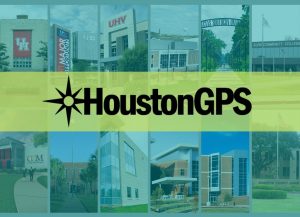
UHCL collaborates in Houston Guided Pathways to Success consortium
Since 2015, UHCL has been collaborating with 12 Houston-area colleges in the Houston Guided Pathways to Success (Houston GPS) consortium.
The University of Houston is leading the initiative in a collaborative partnership with six four-year institutions, including UHCL, University of Houston-Downtown, University of Houston-Victoria, Prairie View A&M University and Texas Southern University.

There are also seven two-year institutions included in the initiative: Alvin Community College (ACC), College of the Mainland, Galveston College, Houston Community College System, Lone Star College System, San Jacinto College District (SJCD) and Wharton County Junior College.
“Being a member of Houston Guided Pathways to Success provides a unique opportunity to strengthen educational opportunities for students across our region through transfer programs,” said UHCL President Ira. K. Blake. “We are able to leverage UH-Clear Lake’s distinctive academic programs and contribute to seamless learning opportunities across colleges, universities, disciplines and faculty expertise.”
The Houston GPS consortium focuses on student success in all forms and is taking a proactive approach in assuring that students have a smooth transition from a two-year into a four-year institution.
“You can advise by just doing a transaction, which is where you meet with the student and check off a box, or you can be more proactive, which is one of the real benefits,” said Steven Berberich, senior vice president for academic affairs and provost of UHCL.
The Houston GPS system has developed meta majors and degree maps so that if a student is transferring from a two-year into a four-year institution, the courses taken at one of the two-year institutions like SJCD or ACC will transfer to any of the four-year institutions in the consortium.
“Meta majors are like buckets, so if a student is going to a junior college or a community college and they want to major in something for business, there would be a meta major built around business,” said Timothy Richardson, UHCL associate vice president for student success and initiatives.
Each year, representatives from each of the consortium’s 13 institutions get together at University of Houston to go over each degree plan, class by class, looking for transfer pathways.
If an institution requires a certain class, the class will transfer to any of the institutions listed in the consortium.
“The Houston GPS consortium is removing transfer barriers so that when students get to a four-year institution, there will not be any surprises,” Berberich said. “Before students waste time and money on classes they do not need, academic advisers will get students prepared on what they need to be taking in order to transfer into a four-year institution.”
The Houston GPS consortium is built upon student success. Faculty and staff will build up the pillars, in order to make students successful in their academics.
“We are doing this in the interest of removing student barriers and making sure in our advising and practices, we are doing things not in a transactional way, but making sure that there is that informed choice,” said Richardson. “Making sure that there are holistic conversations between advisors and students and looking at the student’s interests, career-wise.”
The Houston GPS focuses on institutional equity inventory and climate assessments which is to identify and map existing equity efforts and assets to identify gaps and strategic areas of focus for equity projects, such as inventory. It is also used to engage student feedback to understand and/or assess the campus climate at institutions to help identify where action is needed.
There is equity competency training and project design which helps leaders, faculty and staff improve knowledge, in terms of equity.
The Houston GPS also developed project design implementation coaching, which advises staff and faculty on how to implement changes to address equity in their classes and/or departments. Additionally, equity community of practice addresses equity issues and uses the collaborative nature of the Houston GPS to come up with best practices that would help each campus.
“Student success is not just about meta majors and proactive advising, it is also about dealing with inequities and creating an inclusive culture and helping all the campuses individually improve in these areas,” Berberich said.
The Houston GPS system has come together as a group and are putting forward a proposal for a grant opportunity to generate revenue to engage as a group activity around equity and inclusion.
“UHCL is agreeing to eliminate racial and economic injustices impacting the success of our students and our communities,” President Blake said in a Student Government Association (SGA) town hall meeting Sept. 11.
For equity and inclusive culture, the provost is working with faculty on these initiatives. Scott Richardson, Chief Diversity Officer and Title IX coordinator at UHCL is reviewing the work of the University of Southern California’s Race Diversity and Equity Institute, who are also using the GPS system.
“The network of colleges, universities and leaders share a common goal: to produce successful citizens who will positively impact the communities in which they live and serve, and ultimately the world,” Blake said.
